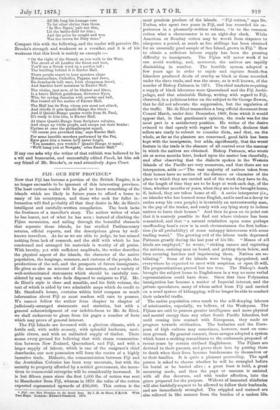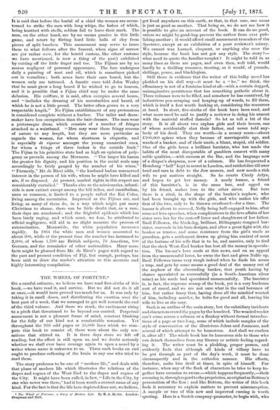FIJI: OUR NEW PROVINCE.*
Now that Fiji has become a portion of the British Empire, it is no longer excusable to be ignorant of this interesting province. The least curious reader will be glad to know something of the islands which are likely in future years to afford a home to many of his countrymen, and those who seek for fuller in- formation will find probably all that they desire in Mr. de Ricci's intelligent and carefully-written compilation. The book lacks the freshness of a traveller's story. The author writes of what he has learnt, not of what he has seen ; instead of climbing the Fijian mountains, and sailing through the beautiful channels that separate those islands, he has studied Parliamentary returns, official reports, and the descriptions given by well- known travellers. As far as we are able to judge, he has missed nothing from lack of research, and the skill with which he has condensed and arranged his materials is worthy of all praise. With brevity, yet with sufficient amplitude, the writer describes the physical aspect of the islands, the character of the native population, the language, manners, and customs of the people, the productions of the soil, and the prospects of future immigrants. He gives us also an account of the annexation, and a variety of well-authenticated statements which should be carefully con- sidered by any man who feels disposed to emigrate to Fiji. Mr. de .Rie,ci's style is clear and sensible, and his little volume, the text of which is aided by two admirable maps which do credit to Mr. Stanford's house, contains within brief compass as much information about Fiji as most readers will care to possess. We cannot follow the author from chapter to chapter of judiciously-arranged statements and statistics, but with a general acknowledgment of our indebtedness to Mr. de Ricci, we shall endeavour to glean from his pages a number of facts which may prove of general interest.
The Fiji Islands are favoured with a glorious climate, with a fertile soil, with noble scenery, with splendid harbours, navi- gable rivers, and with an unlimited supply of timber. There seems every ground for believing that with steam communica- tion between New Zealand, Queensland, and Fiji, and with a larger supply of labour, which is one of the emigrant's chief drawbacks, our new possession will form the centre of a highly lucrative trade. Hitherto, the communication between Fiji and the Australian Colonies has been very uncertain, but with the security to property afforded by a settled government, the incen- tives to commercial enterprise will be considerably increased. It is but fifteen years since the first 1,000 lbs. of cotton was sent to Manchester from Fiji, whereas in 1870 the value of the cotton exported represented upwards of £90,000. This cotton is the Fiji: our New Province in the South Seas. By J. H. de Bleci, FAG.% With Two Maps. London: Edward Stanford. 1870. most precious produce of the islands. "Fiji cotton," says Dr. Forbes, who spent two years in Fiji, and has recorded his ex- periences in a pleasantly-written volume, "is to the common cotton what a chronometer is to an eight-day clock. While American or Bombay cotton may be worth from sixpence to ninepence a pound, as much as five shillings has been obtained for an unusually good sample of Sea Island, grown in Fiji." How to obtain a sufficient labour supply has been the pressing difficulty to immigrants. The Fijian will never work if he can avoid working, and, moreover, the natives are rapidly diminishing in number. The horrible system adopted a few years ago in order to cajole and capture South-Sea. Islanders produced deeds of cruelty as black as those recorded under the slave trade, and was the cause, as is well known, of the murder of Bishop Patteson in 1871. The chief markets requiring a supply of black labourers were Queensland and the Fiji Archi- pelago, and that admirable Bishop, writing with regard to Fiji, observed, in a judicious letter on the subject to Sir George Bowen, that he did not advocate the suppression, but the regulation of the traffic. Mr. de Ricci transcribes a long official document from Consul March, under date December, 1869, from which it would appear that, in that gentleman's opinion, the trade was for the most part in a satisfactory position. He writes of the desire evinced to deal openly with regard to the traffic, declares that sellers are ready to submit to consular dicta, and that, on the whole, as far as the planters are concerned, good faith has been kept with the immigrants, but adds, signifieantly, that the worst feature in the trade is the absence of all control over the manner in which the natives are obtained. Bishop Patteson, who wrote six or seven months later, looked upon the matter less cheerfully, and after observing that the dialects spoken in the Western Islands of the Pacific are very numerous, and that there are no interpreters, adds :—" The vast majority of natives taken from their homes have no notion of the distance or character of the place to which they are carried and of the work they have to do, of the length of time they are to be kept at work each day, of the time, whether months or years, when they are to be brought home, if, indeed, they are taken home at all A native interpreter (i.e., an islander who has learned some English, and is used as a decoy to entice away his own people) is invariably an untrustworthy man, in the pay of the trader, and ready with any lying story to induce natives to leave their homes." And then he goes on to point out that it is scarcely possible to find out where violence has been committed, and that "a natural retaliation upon some perhaps unoffending boat's crew is in such circumstances the first indica- tion (in all probability) of some unhappy intercourse with some trading vessel." The growing evil of the labour trade depressed Patteson greatly during the last year of his life. "Means of all kinds are employed," he wrote, "sinking canoes and capturing the natives, enticing men on board, and getting them below, and then securing hatches and imprisoning them. Natives are re- taliating." Some of the islands were being depopulated, and everywhere he expected to meet with suspicion or open ill-will. His prognostications proved but too true. The Bishop's death brought the subject home to Englishmen in a way no mere verbal representations could have done. Since that time Polynesian immigration has become a matter of Imperial interest, and the private speculators, many of whom sailed from Fiji and carried on a cruel system of kidnapping, will no longer be able to conduct their unlawful traffic.
The native population owes much to the self-denying labours of missionaries, especially, we believe, of the Wesleyans. The Fijians are said to possess greater intelligence and more physical and mental energy than any other South Pacific Islanders, but until coming into contact with Europeans, they made no progress towards civilisation. The barbarian and the Euro- pean of high culture may sometimes, however, meet on com- mon ground. By general consent, these savages adopted a system which bears a striking resemblance to the euthanasia proposed of recent years by certain civilised Englishmen. The Fijians are devoted to their parents, and prove their love by putting them to death when their lives become burdensome to themselves or to their families. It is quite a pleasant proceeding. The aged person is asked to choose whether he will be strangled before his burial or be buried alive ; a great feast is held, a great mourning made, and then the papa or mamma is assisted with all due decorum, and with tender affection, into the grave prepared for the purpose. Widows of lamented chieftains will also bashfully request to be allowed to follow their husbands, and are immediately strangled. The crippled and maimed are also relieved in like manner from the burden of a useless It is said that before the burial of a chief the women are accus- tomed to strike the men with long whips, the lashes of which, being knotted with shells, seldom fail to leave their mark. The men, on the other hand, are by no means passive in this little game, and retort by flirting hard little balls of clay from pieces of split bamboo. This amusement may serve to inure them to what follows after the funeral, when signs of sorrow are (or rather were, for the horrid custom, like other customs we have mentioned, is now a thing of the past) exhibited by cutting off the little finger and toe. The Fijians are by no means negligent of personal appearance. The face undergoes daily a painting of soot and oil, which is sometimes picked out in vermilion ; both sexes have their ears bored, but the women only are tattooed. A fanatic once told John Wesley that he must grow a long beard if he wished to go to heaven, and it is possible that a Fijian chief may be under the same delusion. His coiffure, it is said, often occupies several hours, and "includes the dressing of his moustachios and beard, of 'which he is not a little proud. The latter often grows to a very respectable length." No Fijian establishment of any pretensions is considered complete without a barber. The tailor and dress- maker have less occupation than the hair-dresser. The men wear a picturesque dress, which consists of a number of fringes attached to a waistband. "Men may wear these fringy screens of nature to any length, but they are more particular as regards the women, for whom shortness is etiquette, and is especially de rigneur amongst the young unmarried ones, for whom a fringe of three inches is the outside limit." The Fijian in his primitive state had as high an opinion of poly- gamy as prevails among the Mormons. "The larger his harem the greater his dignity, and his position in the social scale may accordingly be fairly gauged by the number of his wives." " Formerly," Mr. de Ricci adds, "the husband had an unreserved interest in the person of his wife, whom he might have killed and ate, if so disposed. At present, marital rights in this respect are considerably curtailed." Thanks also to the missionaries, infanti- cide is now extinct except among the bill tribes, and cannibalism, once so common, is limited to a people called the Kai Cobs, living among the mountains. Improved as the Fijians are, and living, as many of them do, in a way which might put many Christians to shame, there can be little doubt that, as a race, their days are numbered ; and the frightful epidemic which has been lately raging, and -which must, we fear, be attributed to official negligence, will aid in no slight measure the process of extermination. Meanwhile, the white population increases rapidly. In 1864 the white men and women amounted to about 300, while at the present time the number has increased to 2,000, of whom 1,700 are British subjects, 70 American, 100 German, and the remainder of other nationalities. Many more facts might be gleaned from Mr. de Ricci's pages with regard to the past and present condition of Fiji, but enough, perhaps, has been said to draw the reader's attention to this accurate and highly interesting compilation.



































 Previous page
Previous page